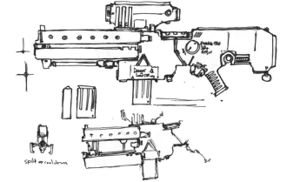Difference between revisions of "Weapon Heavy nfc GU34"
| Line 15: | Line 15: | ||
}} | }} | ||
| − | The GU-34 is a gauss rifle (a type of coilgun) that uses ingenious scaled-down mechanisms borrowed from Falken's destructive tool, the RID. The projectile is a tungsten-core coil-induced-round (CIR) that is launched into the barrel via a small electric hammer aft of the barrel assembly. Given that there is no rifling in the barrel itself, it generates spin by tiny fins that deploy after leaving the barrel. The barrel uses perfectly-timed magnetic forces to accelerate the round over the length of the barrel to a blistering | + | The GU-34 is a gauss rifle (a type of coilgun) that uses ingenious scaled-down mechanisms borrowed from Falken's destructive tool, the RID. The projectile is a tungsten-core coil-induced-round (CIR) that is launched into the barrel via a small electric hammer aft of the barrel assembly. Given that there is no rifling in the barrel itself, it generates spin by tiny fins that deploy after leaving the barrel. The barrel uses perfectly-timed magnetic forces to accelerate the round over the length of the barrel to a blistering 600 meters per second, almost twice the speed of sound as it leaves the barrel. The electrical discharge from the coils leaves hot gases in its wake and generates a bright flash of excited plasma. With recent advancements in CNT capacitors, the prototype GU-34 is capable of a two-round burst, but at the cost of velocity and stopping power as a tradeoff for putting more rounds down range. |
The housing for the capacitors gets extremely hot with repeated firing and the weapon has external heatsinks on both sides of the capacitor's housing. For operator safety, it is recommended to hold the weapon by the designated location forward of the magazine which also serves as a lever to lock the magazine in place. | The housing for the capacitors gets extremely hot with repeated firing and the weapon has external heatsinks on both sides of the capacitor's housing. For operator safety, it is recommended to hold the weapon by the designated location forward of the magazine which also serves as a lever to lock the magazine in place. | ||
Revision as of 21:10, 3 December 2018
| GU-34 | |
|---|---|
 GU34 (sagauss.jpg) | |
| Type | Heavy Gauss Rifle |
| Service | |
| Used by | Private Military Corporations |
| Wars | Second Antarean War |
| Production | |
| Manufacturer | Falken |
| Unit cost |
Error: no local variable "cbt" was set. Combat Error: no local variable "sup" was set. Support Error: no local variable "cmd" was set. Command |
| Specifications | |
| Weight | Expression error: Unexpected < operator. kg |
| Cartridge | CIR5-12.5mm |
| Damage Inflicted | Error: no local variable "dmg" was set. |
| Rate of fire | Expression error: Unexpected < operator. per second |
| Optimal range | Expression error: Unexpected < operator. m |
| Secondary Firing Mode | Error: no local variable "mode" was set. |
| Magazine | Error: no local variable "ammo" was set. rounds |
| Spare Magazines | Error: no local variable "spares" was set. |
|
| |
The GU-34 is a gauss rifle (a type of coilgun) that uses ingenious scaled-down mechanisms borrowed from Falken's destructive tool, the RID. The projectile is a tungsten-core coil-induced-round (CIR) that is launched into the barrel via a small electric hammer aft of the barrel assembly. Given that there is no rifling in the barrel itself, it generates spin by tiny fins that deploy after leaving the barrel. The barrel uses perfectly-timed magnetic forces to accelerate the round over the length of the barrel to a blistering 600 meters per second, almost twice the speed of sound as it leaves the barrel. The electrical discharge from the coils leaves hot gases in its wake and generates a bright flash of excited plasma. With recent advancements in CNT capacitors, the prototype GU-34 is capable of a two-round burst, but at the cost of velocity and stopping power as a tradeoff for putting more rounds down range.
The housing for the capacitors gets extremely hot with repeated firing and the weapon has external heatsinks on both sides of the capacitor's housing. For operator safety, it is recommended to hold the weapon by the designated location forward of the magazine which also serves as a lever to lock the magazine in place.
The commercially produced version does not feature the two-round burst select-fire option and is generally expensive to operate, given the proprietary rounds, tools, and components exclusively manufactured by Falken; however, this doesn't serve to stop the enthusiast marksman from procuring and hoarding parts.
| ||||||||||||||||||